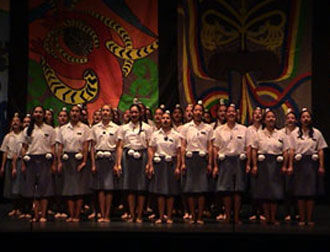Hear 'Now is the hour' sung by the St Joseph's Maori College Girls' Choir.
‘Now is the hour’ ('Po Atarau' / ‘Haere ra’): New Zealand’s first million-selling song?
Po atarau
E moea iho nei
E haere ana
Koe ki pamamao
Haere ra
Ka hoki mai ano
Ki i te tau
E tangi atu neiNow is the hour,
when we must say goodbye
Soon you'll be sailing,
far across the sea.
While you're away,
Oh please remember me.
When you return,
you'll find me waiting here.
The origins of ‘Now is the hour’ can be traced back to the ‘Swiss cradle song’ by Clement Scott. This popular piano piece was released in 1913 by the Australian music company of W.H. Paling and Co. In New Zealand it was quickly adapted for the song ‘Po atarau’ and used to farewell Maori soldiers departing for the First World War.
The song was modified in 1920 by Maewa Kaihau who wrote the verse ‘This is the hour’. By 1935 it was known as the ‘Haere ra waltz song’, and it became a favourite as the last waltz at dances and farewells. It was heard often during the Second World War as soldiers were farewelled.
‘Now is the hour’ highlights the blending of Maori and European traditions to produce a song that could be understood and appreciated by both the Maori and European communities.
In 1945, British wartime singer Gracie Fields visited New Zealand and heard the song performed by a concert party in Rotorua. Her driver, an Auckland dance band leader, taught her the song, and in July 1947 Fields sang her version on a BBC radio programme. Her recording of ‘Now is the hour’ became a huge international hit. Then, in February 1948 a version by Bing Crosby entered the United States charts. It was Crosby’s 42nd (and, somewhat appropriately, last) single to reach the top of the pop charts.
In January 1948 Time magazine explained that:
Everybody else was singing it before Americans even heard of it. It began 35 years ago as the Swiss Cradle Song, written by an Australian. Then a Maori woman, who liked the tune made up some words to go with it, sang it at a Maori festival. The natives picked it up; so did white New Zealanders who mistakenly thought it an old Maori folksong.
Then England's Gracie Fields got hold of it. By now it had new lyrics and a new title: ‘Now Is the Hour’. Her brassy-voiced music-hall record of the catchy, draggy tune has been No. 1 on England's hit parade for 23 weeks. London Records decided that the song was just what they were looking for to crash the rich U.S. record market. Last week 24,000 records (weighing six tons) of Gracie Field’s version arrived in Manhattan, the biggest shipment of foreign records ever to hit the U.S. Gracie wouldn't have the place to herself. Bing Crosby, Kate Smith and Eddy Howard all managed to put the song on records before Jimmy Petrillo, by putting a stop to all U.S. recording, got off his own variation on ‘Now Is the Hour’.

St Joseph's Maori College Girls Choir.

Community contributions